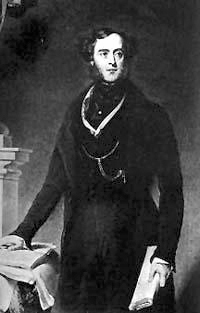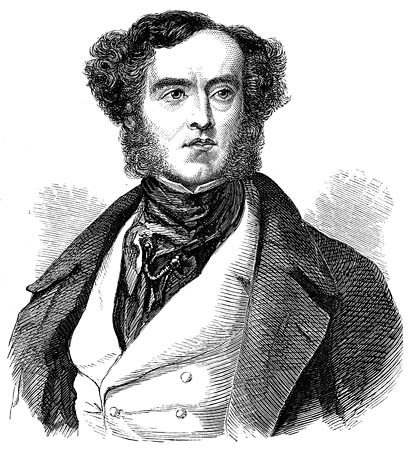<Back to Index>
- Economist Irving Fisher, 1867
- Poet Henry Wadsworth Longfellow, 1807
- Member of Parliament William George Frederick Cavendish - Scott - Bentinck, 1802
PAGE SPONSOR



Lord (William) George Frederick Cavendish - Scott - Bentinck (27 February 1802 – 21 September 1848), better known as simply Lord George Bentinck, was an English Conservative politician and racehorse owner, best known (with Benjamin Disraeli) for his role in unseating Sir Robert Peel over the Corn Laws.
Bentinck was a younger son of the 4th Duke of Portland, and elected a Member of Parliament (MP) for King's Lynn in 1828, which constituency he represented, in succession to his uncle, William Henry Cavendish - Bentinck, until his death. Although initially a follower of George Canning, Bentinck supported the Whigs over the question of parliamentary reform. However, in 1834 he broke with the Whigs and, like Lord Stanley and Sir James Graham, among others, joined the new Conservative Party (via the short lived political centre grouping known as the 'Derby Dilly ') which formed under the leadership of Peel.
Bentinck first became prominent in politics in 1846 when he, with Disraeli, led the protectionist opposition to the repeal of the Corn Laws. Until he rose to speak against their repeal, he had not spoken a word in eighteen years in Parliament. Historians see Bentinck's participation as vital, for the majority of those who opposed repeal were country gentlemen, who were far more likely to follow the son of a Duke than Disraeli, an Anglicized Sephardic - Jewish literary figure of somewhat ill repute. Although Bentinck and Disraeli did not prevent the repeal of the Corn Laws, they did succeed in forcing Peel's resignation some weeks later over the Irish Coercion Bill. The Conservative Party broke in half; some hundred free - trade Peelites followed Peel, while two hundred and thirty protectionists formed the new Conservative Party, with Stanley (later the Earl of Derby) as overall leader. Bentinck became leader of the party in the House of Commons.
Bentinck resigned the leadership in 1848, his support of Jewish emancipation being unpopular with the bulk of the party, and was succeeded by the Marquess of Granby. He died of a heart attack in September of that year. There have been rumours, first appearing in the memoirs of the politician and journalist Louis John Jennings, that it was not a heart attack. Bentinck's interest in horse racing may have led to his betting against Dr. William Palmer of Rugeley, and Jennings suggested that Palmer poisoned Bentinck. Most historians dismiss this story as false.
Clerk to the Privy Council Charles Greville wrote after Bentinck's death: "He brought into politics the same ardour, activity, industry and cleverness which he had displayed on the turf . . . having once espoused a cause and espoused a party, from whatever motive, he worked with all the force of his intellect and a superhuman power of application in what he perceived to be the interest of that party and that cause . . . [However] I have not the least doubt that, for his own reputation and celebrity, he died at the most opportune period; his fame had probably reached its zenith, and credit was given him for greater abilities than he possessed."
In addition to his political activities, Bentinck was well known for his interest in "the Turf." Bentinck owned several successful race horses and his stable was renowned for its quality. Bentinck was particularly admired in many quarters for his efforts to eliminate fraud in the sport.
He is commemorated with a statue in London's Cavendish Square Gardens.
The department of Manuscripts and Special Collections, The University of Nottingham holds the correspondence and personal papers of Lord George Bentinck (Pw L), as part of the Portland (Welbeck) Collection. The Portland Estate Papers held at Nottinghamshire Archives also contain items relating to the 5th Duke's properties.